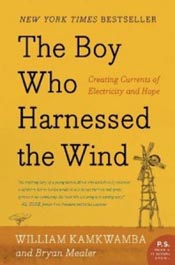Title: The Boy Who Harnessed the Wind: Creating Currents of Electricity and Hope
Author: William Kamkwamba and Bryan Mealer
Genre: Memoir
Year: 2009
Acquired: From the publisher for review as part of TLC Book Tours
Rating: 




One Sentence Summary: Unable to afford school, 14-year-old Malawian William Kamkwamba pursued his education at his village library where his life was changed by a book called Using Energy.
One Sentence Review: William’s memoir was the perfect combination for me – compelling story, strong narrative voice, and connections to real life.
Why I Read It: I love memoirs, especially about people totally unlike me, which made this one a great choice. It ended up being unexpectedly perfect in the ways it connected back to my new job and interests.
Long Review: When William Kamkwamba was 14-years-old he was one of millions of poor rural villagers in Malawi, struggling to survive after a devastating famine in 2001. Because of the food crisis, William’s family didn’t have the money to pay required fees to send him to school. Friends and neighbors were starving, and the government refused to see what was happening.
 Instead of loafing around or feeling sorry for himself, William decided he wanted to keep up with his classmates and spent many afternoons at his village’s small library, beefing up on English, social studies, math, and physics.
Instead of loafing around or feeling sorry for himself, William decided he wanted to keep up with his classmates and spent many afternoons at his village’s small library, beefing up on English, social studies, math, and physics.
There he found the book Using Energy by Dr. Mary Atwater, which showed, among other things, a diagram and explanation of how windmills worked. William was inspired, and began collecting the pieces to build his own.
While other kids his age went to school, William dug around in a local scrap yard, collecting PVC pipe, a bicycle frame, a tractor fan, and other discarded pieces to build his windmill. Despite being called crazy by others in the village, William continued to piece together the project with help from close friends.
When the windmill was finished, William started it up and was able to provide consistent, renewable power to his family for the first time.
Eventually, word of William’s project was picked up and visitors from around the world started to pay attention. With their help, William’s work was recognized. Since that time he’s spoken at international conferences, gone back to school, and now attends Dartmouth University.
 The Boy Who Harnessed the Wind is a collaboration between William and co-author Bryan Mealer, and tells William’s story of surviving famine and poverty to working to bring power and education to his village.
The Boy Who Harnessed the Wind is a collaboration between William and co-author Bryan Mealer, and tells William’s story of surviving famine and poverty to working to bring power and education to his village.
(Normally I refer to an author by their last name, a journalistic convention, but William’s last name is cumbersome to type, so I’m using his first name – no disrespect intended).
I really, really loved this book, in part because I found the story inspiring, and in part because I thought it was written in a way that captured William’s voice and spirit perfectly. It’s the kind of book that made me feel excited and optimistic about the idea that a single person can really change the world.
Admittedly, there are some tiny problems with it – the technical explanations of how a windmill works were a little dry and the last few chapters that focus on William’s life after being “discovered” feel rushed – but overall I thought this was a truly excellent memoir.
Life in Malawi during the famine was terrible, and the book does a lovely job explaining what happened and what the impacts were without being unnecessarily gruesome. Instead, it focuses specifically on what happened to William’s family and uses those specific stories – like one about William trying to care for his starving dog – to make the larger tragedy really hit home. I’ll admit to crying at least a couple of times.
But for me, one of the coolest parts about reading this book was the way it connects to many of the things I talk about with my new job writing for a magazine designed for engineers and developers. William embodies the idea of the design engineer, tinkering and playing with projects to change the world.
The other cool thing is that William was first recognized at TEDGlobal 2007 – a program I’m familiar with since starting to work here. TED is a nonprofit dedicated gathering people together to share “ideas worth spreading.” They host a series of conferences each year, then post videos of speakers online to watch. It’s awesome – they’ve recently featured authors like Clay Shirky and Sheena Iyengar – as well as scientists, artists others. (Here’s William’s TED profile).
UPDATED TO ADD: If you’re viewing this post in a reader, the videos might not show up. Click through to watch 🙂
This is the video of William’s first talk at TEDGlobal in 2007, which he writes about in the book:
William was invited to speak at TED again in 2009, where he gave a more polished talk about his windmill project:
Inspiring, yes?
With a book like this one – one you want to gush about because it hits a perfect combination of great story and clear connections to real life – it’s sometime hard to say whether everyone will love it as much.
In this case, I really think it’s a yes. William’s story inspired me, and it’s one I keep wanting to share with everyone I know.
Other Reviews: Books By Their Cover | Chick With Books | Book Club Classics! | Find Your Next Book Here | The Zen Leaf | Eclectic/Eccentric | Reviews from the Heart | Word Lily |
If you have reviewed this book, please leave a link to the review in the comments and I will add your review to the main post. All I ask is for you to do the same to mine — thanks!


Comments on this entry are closed.
Great review, Kim! This is one of those books that’s been popping up on my radar quite a bit over the last year. Thanks for the video.
How far does the book follow William’s story? Is the windmill still in use? and did William’s project inspire more like it or improve his village overall? I always wonder if a project like that can have a effect on the larger community, or does the narrative follow only William’s individual story (which is not a bad thing either).
tolmsted: The book stops right after William gets some global recognition and gets to attend a new school, I think. The paperback I read has a follow up that fills in what’s happened to William since the hardcover came out. Since then, William’s worked with others to develop a nonprofit that’s trying to improve the village as a whole — it’s pretty cool.
Very inspiring. This is a book I’m looking forward to reading myself at some point!
Amy: The book left me feeling really optimistic, which was nice. I hope you get a chance to read it.
I really loved this book, too. Perhaps it found me with different commonalities than it did you, but it hit home, all the same. My review: http://wordlily.com/2009/09/29/the-boy-who-harnessed-the-wind-by-william-kamkwamba-and-bryan-mealer/
Word Lily: Thanks for leaving your review link — I’ll be sure to add it. And I think there are a lot of different ways one could connect with this book and the story.
I don’t read memoirs very often, but this one sounds interesting. I’ve added it to my list. Thanks. 🙂
Chandra: I think this is great memoir — an interesting story written in a compelling way.
I just got past the famine section and am now reading about William’s search for windmill parts. Like you I was very touched by the hardship his village experience. And the part with his dog – so sad!
I’m familiar with the TED videos but hadn’t seen William’s before – off to watch it now.
Thanks for being a part of the tour!
Heather: The part with the dog just broke my heart. The whole famine was hard to read about, especially when the government refused to do anything about it. I hope you enjoyed the TED videos.
I loved this book too and agree that some of it was a little too technical, but what a story! William is an inspiration!
Kathy: Totally agree — it was a great story.
I wish I hadn’t known so much about this book in advance so that I could have experienced it the way so many others have and really enjoyed it. :/
Amanda: I remember your review being not-so-glowing, but I skimmed it because I don’t like knowing much about a book ahead of time. I’ll have to go find it again.
Hi,my name is carlos.i was wondering if you guys could give me all the malawian words in the book and there meaning thanks.
Carlos: Sounds like a homework assignment to me — one you should probably work on yourself. Good luck!
Chuckling at Carlos…
Anyway, I too loved this book. I’m probably one of the few who didn’t find it too technical — not that I wanted it to be *more* technical; just that I thought it had the right balance. I still consider this a book I wish even more people would read.
Valerie: I’m glad you didn’t think it was too technical – I think that’s probably a balance for anyone reading. And I agree that it’s a book I think more people should read. I enjoyed it a lot!
this book is very good
Glad you enjoyed it!
I thought that yes, this was a compelling read, but I agree with kathy that it was too technical for its audience. Unlike Valerie I believe that William didn’t need to explain to us in great detail which kind of pulley system he used, maybe i’m being unfair I just really wanted to read more about the passed down stories of witchcraft, the hardship of famine, and his friend Gilbert, or even his sister Annie, -what happened to her?? In my opinion the book had too much detail in certain chapters and then not enough in other sections. Also, leaving the dog behind to die was awful. I just wouldn’t recommend this book, I expected more.
I think that’s a fair criticism — I suppose it just depends what you’re most interested in reading about.